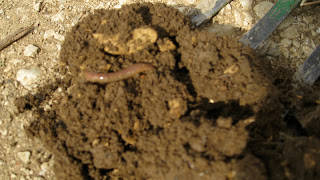Welcome to Friday and another edition of "How I Came to Live in a Barn," the series that strives to connect drinking to farming as relevantly as humanly possible.
As a quick preface to this series, from April to December of 2010 I lived in a barn. No electricity, running water, MTA strikes or lollygagging. During that time I worked on a legitimately (though proudly uncertified) organic farm in Southern Kentucky. This series is about the many whims, fascinations and revelations that eventually inspired me to kick the kicks, buy some boots and go farming. Once we catch up to the present, I'll use the occasion to explain what I'm up to now, you know, beyond the blaug. Is this preface going to appear at the beginning of the entire serious? Almost definitely. Ready? Wunderbar.
How I Came to Live in a Barn: The Bertrand Gautherot Edition
Champagne. September of 2008.
After letting me babble at him in French for a few minutes, Bertrand kindly suggested we speak in English. I liked Bertrand Gautherot Immediately. He was genial, friendly, excited and honest. He grabbed a garden fork and we hopped in his van with his dog Chops (pronounced "shops" in French) and headed down the road to see his cows.
Vouette et Sorbée is located in the southern part of Champagne in Buxières sur Arce, not far from the city of Troyes (pronounced "Twa"). Bertrand, the farmer and winemaker, farms 5 hectares of vines, both pinot noir and chardonnay. An hectare is approximately 2.47105381 acre (thereabouts) and the only compost he uses for everything (including his personal garden) comes from these cows. He's emphatic about how important they are to the farm and how they are the best indication for how things are going. Needless to say, as a very involved winemaker, he checks in with them daily.
We stood and talked about biodynamics while the cattle regarded me impassively, then he brought me to his vines. Vouette et Sorbée has been Demeter certified biodynamic since 1998. His neighbors do not farm organically, however. If I remember correctly, they sell most of their grapes to the bigger houses in Reims and Épernay including Veuve and Moet, both well-over an hour's drive. Making that type of farming a lucrative option, one must boost the yields of their vines exponentially through the use of chemical fertilizers and the like, forming a veritable "wall of grape clusters" as Bertrand puts it. It was a bit freakish-looking, even to a neophyte like myself.
I was there in September, so I got to taste a grape from each kind of vineyard; I got to witness the vitality of his vines in comparison to their's while they were still alive; I got touch the leaves and examine the clusters. It was all wonderfully educational to someone simply trying to understand what the hell biodynamics did, and what made them so different. The answer was far more tangible than anticipated. Bertrand ran to his van and brought back the garden fork. He scooped a chunk of soil from his neighbor's vineyards, and set it gently on the ground. Then he took a chunk of his own (below, left) and sat it right next to his neighbor's (below, right).
Unsurprisingly the differences were remarkable. Barely could you call these two things kin. On the one hand you had somewhat oily and flaccid mud, and on the other you had a fluffy, mossy pillow of soil with an earthworm for punctuation. Bertrand's soil smelled sweet and tasted even sweeter, while his neighbor's smelled like nothing at all so I decided not to taste it. In that moment, organic farming completely made sense to me.
We finished off the tour and went to his house where he opened a bottle of "Fidèle" (his 100% pinot noir), and chatted at his table. He said something that I've never forgotten as I was leaving that afternoon. When I wished him luck on his new importation into the US, he said graciously, "Thank you, but I hope that one day I wont have to import my wines to the US. You can make wine there, maybe one day you'll make your own champagne..." then I left. I'm not even sure if I responded.
Later that evening as I was sitting in a garden in Burgundy, drinking my glass of aligoté, I couldn't shake what he'd said. It was both mind-bendingly ludicrous and completely logical. If one is to view wine as a what it is––a necessary, but simple fermented beverage––then we don't need it to come from anywhere in particular: there's plenty of fruit in the United States from which to make "wine." All that's required is fresh fruit and time, which I'm pretty sure we still have here. It wont be champagne, but who's to say it couldn't be comparable. Or even better––better?
I pondered it for a while, feeling the occasional twinge of patriotism, then returned to my book. I was half-way through "The Omnivore's Dilemma" and completely unaware of how it, and a number of other books, would come to shape my future. Bertrand had planted quite a seed, it was about to receive some cultivation.
Alors, á la semaine prochaine, as they say in French––till next week.
Alors, á la semaine prochaine, as they say in French––till next week.











